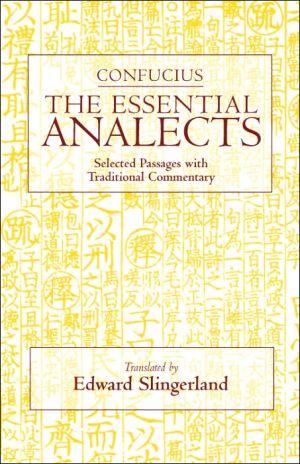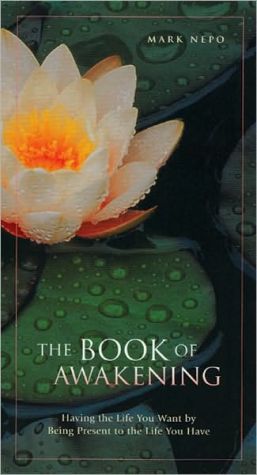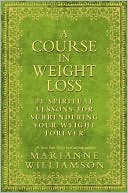The Essential Analects: Selected Passages with Traditional Commentary
The Essential Analects offers a representative selection from Edward Slingerland's acclaimed translation of the full work, including passages covering all major themes. An appendix of selected traditional commentaries keyed to each passage provides access to the text and to its reception and interpretation. Also included are a glossary of terms and short biographies of the disciples of Confucius and the traditional commentators cited.\ \ One of the central books of...
Search in google:
The Essential Analects offers a representative selection from Edward Slingerland's acclaimed translation of the full work, including passages covering all major themes. An appendix of selected traditional commentaries keyed to each passage provides access to the text and to its reception and interpretation. Also included are a glossary of terms and short biographies of the disciples of Confucius and the traditional commentators cited. Publishers Weekly Because they offer diverse and sometimes diametrically opposite meanings, the words of Chinese classics are as likely to reflect the prejudices of the translator as the are to exhibit scholarly rigor. This volume is no exception. The publisher's biography of Leys calls him "an astringent observer," and such observations are readily apparent in Leys's sometimes bad-tempered and occasionally ill-judged glosses on a thinker whom he clearly believes would have agreed with him that late 20th-century culture is undergoing the same chaotic moral crisis as 6th-century B.C. China. While the translations are often elegant, and Leys's endnotes offer a few telling examinations of the vagaries and subtleties of translating the Analects, Leys is too often diverted from the Analects by barely relevant citations from European writers and his own digs at other translators of Confucius. Furthermore, neither the introduction nor the endnotes adequately place Confucius in historical context, making the book strangely vague about Confucius's impact on his time and people. (Jan.)
from Book IV\ \ 1 The Master said, It is Goodness that gives to a neighborhood its beauty. One who is free to choose, yet does not prefer to dwell among the Good–how can he be accorded the name of wise?\ \ 2 The Master said, Without Goodness a man\ Cannot for long endure adversity,\ Cannot for long enjoy prosperity.\ The Good Man rests content with Goodness; he that is merely wise pursues Goodness in the belief that it pays to do so.\ \ 3,4 Of the adage “Only a Good Man knows how to like people, knows how to dislike them,” the Master said, He whose heart is in the smallest degree set upon Goodness will dislike no one.\ \ 5 Wealth and rank are what every man desires; but if they can only be retained to the detriment of the Way he professes, he must relinquish them. Poverty and obscurity are what every man detests; but if they can only be avoided to the detriment of the Way he professes, he must accept them. The gentleman who ever parts company with Goodness does not fulfill that name. Never for a moment does a gentleman quit the way of Goodness. He is never so harried but that he cleaves to this; never so tottering but that he cleaves to this.
MapIntroductionITo Learn, and Then1IIIn Government, the Secret9IIIEight Rows of Dancers19IVOf Villages, Humanity31VKung-yeh Ch'ang41VIJan Yung Is One Who53VIITransmitting Insight, But65VIIISurely T'ai Po79IXThe Master Rarely89XHis Native Village101XIStudies Begin111XIIYen Hui125XIIIAdept Lu137XIVYuan Szu Asked About151XVDuke Ling of Wei169XVIThe House of Chi183XVIIYang Huo193XVIIIThe Lord of Wei205XIXAdept Chang215XXEmperor Yao Said227Notes233Historical Table246Key Terms: An Outline of Confucian Thought247Further Reading251
\ Publishers Weekly - Publisher's Weekly\ Because they offer diverse and sometimes diametrically opposite meanings, the words of Chinese classics are as likely to reflect the prejudices of the translator as the are to exhibit scholarly rigor. This volume is no exception. The publisher's biography of Leys calls him "an astringent observer," and such observations are readily apparent in Leys's sometimes bad-tempered and occasionally ill-judged glosses on a thinker whom he clearly believes would have agreed with him that late 20th-century culture is undergoing the same chaotic moral crisis as 6th-century B.C. China. While the translations are often elegant, and Leys's endnotes offer a few telling examinations of the vagaries and subtleties of translating the Analects, Leys is too often diverted from the Analects by barely relevant citations from European writers and his own digs at other translators of Confucius. Furthermore, neither the introduction nor the endnotes adequately place Confucius in historical context, making the book strangely vague about Confucius's impact on his time and people. (Jan.)\ \ \ \ \ Library JournalSimon Leys is the pseudonym of Pierre Ryckmans (Chinese studies, Univ. of Sydney), who tells us in the foreword that he uses a literary pen name because his intention here was to produce a "writer's translation." In fact, this well-crafted translation of Confucius departs only in subtle ways from other distinguished translations to which Leys gives due credit, such as that by Arthur Waley (1938) and D.C. Lau (1979). When his reading is in any way unusual or when he has added to the text, he discloses his rationale fully in the notes. Leys draws parallels between Confucius and thinkers more familiar to Westerners, from Heraclitus to Emerson. He also allows himself to editorialize when a passage strikes a certain chord in him, bringing a fresh, contemporary reading to what might otherwise be an obscure Chinese concept. Scholars of Chinese may quibble over some of the nuances of translation, but it is the opinions set forth in Leys's notes that will spark lively debate. Recommended for academic collections and other collections in need of a good translation of this classic work.-Mark Woodhouse, Elmira Coll. Lib., N.Y.\ \








